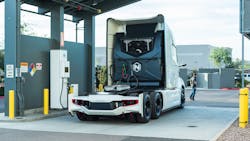Nikola invests $50M to produce clean hydrogen
Nikola Corporation is investing $50 million in a clean hydrogen project being developed by Wabash Valley Resources (WVR) in West Terre Haute, Indiana. The investment, which represents a 20% equity stake in the project, aims to use solid waste byproducts, such as petroleum coke combined with biomass, to produce clean, sustainable hydrogen for transportation fuel and base-load electricity generation while also capturing the carbon dioxide emissions for permanent underground sequestration.
This investment is anticipated to build a hydrogen hub with the ability to offtake about 50 tons a day to supply its future dispensing stations across the Midwest. Exercising its offtake right will likely require significant additional investment by Nikola to build liquefaction, storage, and transportation services.
“We intend this project to produce clean, low cost hydrogen in a critical geography for commercial transportation," said Pablo Koziner, president of energy and commercial at Nikola. “The Wabash solution can generate electricity as well as hydrogen transportation fuel, which should provide the flexibility to support future truck sales and hydrogen station rollout in the region. The expected efficiency of WVR’s clean hydrogen production should allow Nikola’s bundled truck lease, including fuel, service, and maintenance, to compete favorably with diesel.”
The first Nikola Tre hydrogen fuel-cell prototype builds have begun in Arizona and Ulm, Germany, with testing and validation of the vehicles planned into 2022 and serial production expected to commence in 2023. As part of this investment in the hydrogen economy in the Midwest, Nikola intends to build stations across Indiana and the broader Midwest to serve the region.
The completed facility should be able to produce up to 336 tons of hydrogen per day, enough to generate about 285 megawatts of clean electricity, according to the companies. The project is expected to require 125 full-time employees and may support 750 construction jobs. Groundbreaking is expected in early 2022 and will take about two years to complete.
“WVR is developing a multi-product facility, where the hydrogen can be combusted in a turbine to produce clean baseload power,” Simon Greenshields, chairman of the board for WVR, said. “The recent spate of power outages serves as a reminder that the market has a pressing need for a non-intermittent source of clean energy. We also look forward to working with Nikola to bring zero-emission transportation solutions to the Midwest.”
